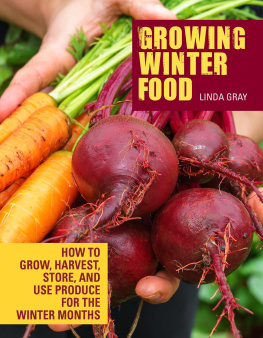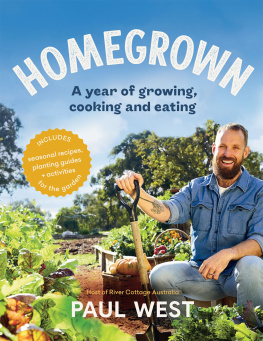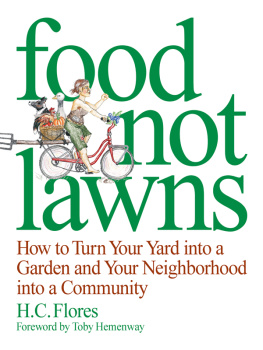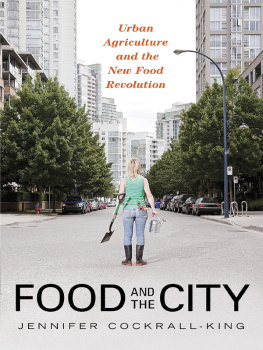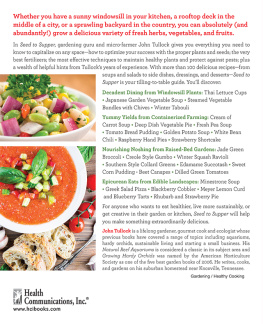For Stephen with love
About the Book
Those of us living in towns and cities might think that the pleasures of growing our own food, watching the seasons pass with the changing produce and getting our hands stuck into the soil are beyond our reach. But a growing number of urban dwellers are realising that there are ways of connecting with the land, and enjoying the sheer pleasure of watching something grow, without giving up the joys of living in the city.
Jojo Tulloh takes us to her inner-city allotment and guides us through a year of cooking, inspired by the food that has sprung from her surprisingly fertile patch of East London waste-ground.
About the Author
Jojo Tulloh is a freelance editor and script developer. She was food editor of the current affairs magazine, The Week for several years. She now divides her time between her family, her garden and her work. She lives in London.
JOJO TULLOH
East End Paradise
kitchen garden cooking in the city
PHOTOGRAPHS BY
Jason Lowe
ENGRAVINGS BY
Andy English

This ebook is copyright material and must not be copied, reproduced, transferred, distributed, leased, licensed or publicly performed or used in any way except as specifically permitted in writing by the publishers, as allowed under the terms and conditions under which it was purchased or as strictly permitted by applicable copyright law. Any unauthorized distribution or use of this text may be a direct infringement of the authors and publishers rights and those responsible may be liable in law accordingly.
Version 1.0
Epub ISBN 9781446444108
www.randomhouse.co.uk
Published by Vintage 2011
2 4 6 8 10 9 7 5 3 1
Copyright Jojo Tulloh 2009
Photographs copyright Jason Lowe 2009
Illustrations copyright Andy English 2009
Jojo Tulloh has asserted her right under the Copyright, Designs and Patents Act 1988 to be identified as the author of this work
First published in Great Britain in 2009 as Freshly Picked by
Chatto & Windus
Vintage
Random House, 20 Vauxhall Bridge Road,
London SW1V 2SA
www.vintage-books.co.uk
Addresses for companies within The Random House Group Limited can be found at: www.randomhouse.co.uk/offices.htm
The Random House Group Limited Reg. No. 954009
A CIP catalogue record for this book is available from the British Library
ISBN 9780099523598
Contents
What wondrous life is this I lead!
Ripe apples drop about my head;
The luscious clusters of the vine
Upon my mouth do crush their wine;
The nectarine and curious peach
Into my hands themselves do reach;
Stumbling on melons, as I pass,
Ensnared with flowers, I fall on grass.
Meanwhile the mind from pleasures less
Withdraws into its happiness;
The mind, that Ocean where each kind
Does straight its own resemblance find;
Yet it creates, transcending these,
Far other worlds, and other seas;
Annihilating all thats made
To a green thought in a green shade.
Andrew Marvell The Garden
INTRODUCTION
I hear the clink of the bottles being carried to the well from which they will be pulled up, cooled, for dinner tonight. One of them, red-currant pink, will accompany the green melon; the other a sand-grown wine, amber-coloured and over-generous, goes with the salad of tomatoes, pimentos and onions soaked in oil, and with the ripe fruit.
Colette Break of Day
Everything I hope this book will be is contained within these few lines from Colette, such simple words yet so purposeful; they feed all five senses and transport you immediately to the warm South. They hold the dream of a better life, a life most city dwellers would think beyond their reach.
Most of us crave a simpler existence. A life lived in harmony with nature. A life connected to the earth and to the seasons. You can call it an earthly paradise or a bee loud glade, its simply the pre-industrial dream we hold on to when our feet are pounding the pavements grey. Whether its a lakeside cabin, a cottage tucked under a wooded hill or a shack on the edge of the sea, its a place where peace drifts slowly down. A place where there would be time to pick wild berries and gather mushrooms, sow salad, dig potatoes, grow flowers, catch fish or maybe even keep bees. For almost all of us it will stay just that, a fantasy, an impracticable dream, but before we give up on it entirely there are small things we can do to weave that vision into our day-to-day life and start making pieces of the dream into reality.
Eight years ago on a grey and forbidding day in East London, I dropped my first seed potato into the sticky, wet March soil and changed the way I cook for ever. The bare, muddy strip of earth I inherited as a novice vegetable grower is almost covered now, with plum trees and artichokes, raspberry canes and rhubarb patches. Flowers self-seed and return each year, breaking up any symmetry I try to impose. The plot slides back and forth, from order to chaos and back again, the only constant the wicker basket that comes home filled to the brim with vegetables and flowers, over and over again.
With each season that has passed, kitchen and allotment have grown closer together. I cannot imagine one without the other and a look at my kitchen bears this out. During spring and summer the blue glass jug on my kitchen windowsill is full of home-grown flowers: borage and marigolds to start with, dahlias and sunflowers later on. Above the sink, sieves, whisks, saucepans and colanders hang from a rack alongside short plaits of garlic and strings of shiny red onions, bunches of dried lemon verbena and sunflower heads waiting to be broken up. Secateurs sit next to a weighing scales and a large ball of twine teeters on top of the Kenwood mixer.
When I come in and lift my heavy basket up onto the kitchen counter I feel a deep sense of satisfaction. As the dirt is washed off and the produce piles up, the cold wet mornings are forgotten. Soon small bowls of cherry tomatoes and squash blossoms sit next to a colander full of beetroot and courgettes waiting to be cleaned, there is a great jumble of knobbly potatoes next to bunches of herbs packed into brown paper bags. It may sound back to front, but growing things has made cooking easier. Fresh produce doesnt need much preparation to raise a meal above the ordinary. An omelette served with a salad of ribbed Italian tomatoes and mustard and rocket flowers can become a supper to remember; a rushed lunchtime sandwich of peppery rocket leaves, tomato, cheese and freshly picked cucumber provides a moment of pure pleasure in a busy day.
In my kitchen cupboards I store up high summer with jars of pickled cucumbers and spring onions, jellies, chutneys, cordials and marmalades; blackcurrants sleep steeping in vodka, waiting for the day they will be turned into cassis. Underneath a 1950s kitchen unit stacked high with spices, tins, noodles, pasta and rice is an old scratched Huntley and Palmer biscuit tin, filled with seeds enough for three allotments.
Cooking from the allotment means I cant help but cook seasonally. Now I pick first and then decide what to make with it. The pressure of trying to plan what to cook is gone; the garden does it for me. Thinning spinach seedlings gives me a handful of baby spinach just enough to add to a dish of chana dhal with mint and lime. There may be only a few late broad beans left but they can be mixed with pesto and spaghetti to make lunch for two and at the other end of the scale, a glut forces me into invention as we face several meals featuring the same vegetable. This year a bumper crop of globe artichokes gave us the luxury of a frittata made entirely with their hearts. Gluts account for the large number of courgette and sorrel recipes in this book, two crops that never let me down. At other times the failure of a crop means I have much less than I expected and must come up with a way to make the most of my precious harvest.
Next page

